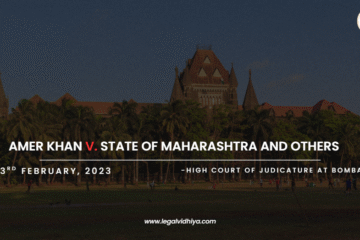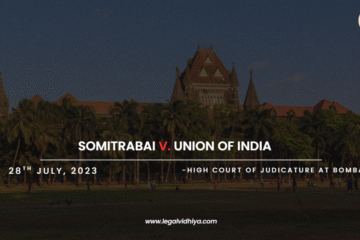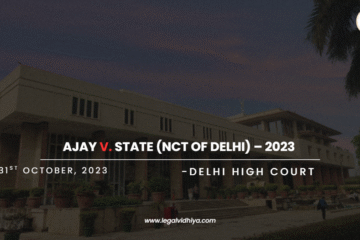
| CITATION | 2024 INSC 325 |
|---|---|
| DATE OF JUDGMENT | 15th March 2022 |
| COURT | Supreme Court of India |
| APPELLANT | Jadunath Singh |
| RESPONDENT | Arvind Kumar & Anr. |
| BENCH | Justice Vikram Nath and Justice Sanjay Kumar |
INTRODUCTION
Jadunath Singh v. Arvind Kumar & Anr. is a significant criminal appeal case heard by the Supreme Court of India, addressing complex legal issues surrounding the grant of bail in cases involving serious criminal offenses. The case stems from two distinct incidents: a violent confrontation on February 11, 2011, where the appellant reported illegal occupation of a plot by the accused, resulting in fatalities and injuries; and a subsequent incident on January 31, 2013, where two respondents, while in custody for another case, orchestrated the murder of a police constable and engaged in gunfire with the police upon arrest. The Supreme Court’s judgment underscores the importance of presenting all relevant facts and circumstances before granting bail, particularly in cases involving individuals with a history of violent criminal conduct, to ensure public safety and uphold principles of justice.
FACTS OF THE CASE
- The incident occurred on February 11, 2011, in Village Bhogaon, where the appellant, Jadunath Singh, reported that the accused, Arvind Kumar, had illegally occupied a plot.
- On the same day, armed with firearms, Arvind Kumar and others opened fire on Jadunath Singh and his companions, resulting in the death of two individuals and injury to another.
- Charges were filed against the accused under various sections of the Indian Penal Code (IPC), including Sections 147 (rioting), 148 (rioting with a deadly weapon), 302/149 (murder committed by an unlawful assembly), and 120B (criminal conspiracy).
- In a separate incident on January 31, 2013, while in custody for another case, respondents Rishi Kumar and Chandra Kumar lured Constable Ajay Kumar and fatally shot him outside the court premises.
- The murder of Constable Ajay Kumar led to the registration of an FIR under Section 302 IPC against Rishi Kumar, Chandra Kumar, and six others for conspiracy to commit murder.
- Following the murder, Rishi Kumar and Chandra Kumar absconded and were later apprehended by the Special Task Force (STF) in Maharashtra.
- During their arrest, Rishi Kumar and Chandra Kumar engaged in gunfire with the police, leading to the filing of a separate FIR.
ISSUES RAISED
- Whether the High Court adequately considered the respondents’ involvement in the murder of a police constable before granting them bail?
- Whether the duration of the respondents’ incarceration alone justified the grant of bail, given the seriousness of the offenses they were accused of?
- Whether the failure to present crucial facts about the respondents’ conduct, including their resistance to arrest and engagement in gunfire with the police, affected the High Court’s decision on bail?
CONTENTIONS OF APPELLANT
- The appellant contends that the accused, including Chandra Kumar and Rishi Kumar, are dangerous criminals involved in serious offenses such as murder and conspiracy. Their release on bail would pose a significant threat to the safety and security of the appellant and his family members.
- The appellant emphasizes the history of violence associated with the accused, citing incidents where they allegedly opened fire on the appellant and his family members over a disputed plot. This violent behavior underscores the potential danger posed by their release from incarceration.
- The appellant raises concerns regarding the involvement of Chandra Kumar and Rishi Kumar in the murder of Police Constable Ajay Kumar during trial proceedings. This demonstrates the severity of their criminal conduct and highlights the risk they pose to law enforcement personnel and the community at large.
- The appellant points out that Chandra Kumar and Rishi Kumar were involved in resisting arrest and firing at the police party during their apprehension, leading to separate criminal charges. This behaviour further substantiates the appellant’s argument against granting bail to individuals with a demonstrated propensity for violence and criminal activity.
Overall, the appellant’s contentions revolve around public safety and the need to prevent potential harm to the community by ensuring that individuals accused of serious crimes, particularly those involving violence against law enforcement and civilians, remain incarcerated pending trial and sentencing.
CONTENTIONS OF REPONDENT
- The respondents argued that they have been in jail for over ten years following their convictions under various sections of the IPC. They contend that this prolonged incarceration is a significant factor warranting the grant of bail, especially considering the time already served.
- The respondents highlight that two other co-accused, Pramod Kashyap and Adesh Kumar, were granted bail by the High Court. They argue that the principle of parity should apply, and they should also be granted bail based on similar circumstances and charges.
- The respondents maintain their innocence and assert their right to be considered innocent until proven guilty. They argue that bail should be granted to them pending the outcome of their appeals against the convictions.
- Finally, the respondents invoked their fundamental right to liberty and argue that bail is a constitutional right unless there are compelling reasons to deny it based on specific risks or circumstances related to the case.
These contentions reflect the respondents’ perspective on why bail should be granted to them pending the outcome of their appeals, focusing on factors such as the duration of incarceration, principles of fairness and parity, presumption of innocence, and personal considerations.
JUDGEMENT
The Supreme Court dismissed the appeal against Arvind Kumar, finding the High Court’s exercise of discretion appropriate under the circumstances. Consequently, Arvind Kumar’s bail was upheld. However, the Supreme Court allowed the appeals against Chandra Kumar and Rishi Kumar, setting aside the High Court’s order granting them bail.
The Court held that the reasons provided by the High Court, specifically the incarceration period and the bail status of co-accused, were insufficient to justify bail for Chandra Kumar and Rishi Kumar. The Supreme Court emphasized that bail decisions should be based on a comprehensive assessment of individual circumstances and not merely on general considerations.
As a result, Chandra Kumar and Rishi Kumar were directed to surrender within two weeks, failing which the High Court was instructed to take appropriate steps to ensure their custody using lawful coercive measures. This judgement underscores the necessity for fairness and thorough evaluation in bail matters, reinforcing the principles of equity and justice in the judicial process.
ANALYSIS
The case of Chandra Kumar and Rishi Kumar’s criminal appeals, culminating in the Supreme Court’s decision to cancel their bail despite extended incarceration, highlights broader societal implications regarding the administration of justice and public safety. The judgment underscores the judiciary’s critical role in balancing individual rights with the imperative to safeguard communities from potential threats posed by individuals accused of serious crimes. By emphasizing the need for comprehensive consideration of relevant facts and behaviours, especially those involving violence against law enforcement, the ruling sets a precedent for ensuring that bail decisions reflect a nuanced understanding of the gravity of criminal offenses and their potential impact on society at large. This case serves as a reminder of the judiciary’s responsibility to uphold public trust and preserve community well-being through judicious applications of legal principles in cases of significant societal consequence.
This judgment also underscores the importance of considering all relevant facts and circumstances before granting bail, particularly in cases involving serious offenses and individuals with a history of criminal conduct.
CONCLUSION
The judgment in Jadunath Singh v. Arvind Kumar & Anr. highlights the critical importance of complete and transparent presentation of facts when seeking bail, particularly in cases involving severe criminal charges and individuals with a history of violent behaviour. The decision underscores the judiciary’s commitment to ensuring public safety while upholding principles of justice and due process.
REFERENCES
- SCC Online
- INDIA KANOON
- https://www.advocatekhoj.com/library/judgments/announcement.php?WID=17509#:~:text=Trial%20Court%20after%20appreciating%20the,IPC%20and%20awarded%20life%20sentence.
This Article is written by POORNA.R student of School of excellence in law, Chennai; Intern at Legal Vidhiya.
Disclaimer: The materials provided herein are intended solely for informational purposes. Accessing or using the site or the materials does not establish an attorney-client relationship. The information presented on this site is not to be construed as legal or professional advice, and it should not be relied upon for such purposes or used as a substitute for advice from a licensed attorney in your state. Additionally, the viewpoint presented by the author is of a personal nature.




0 Comments